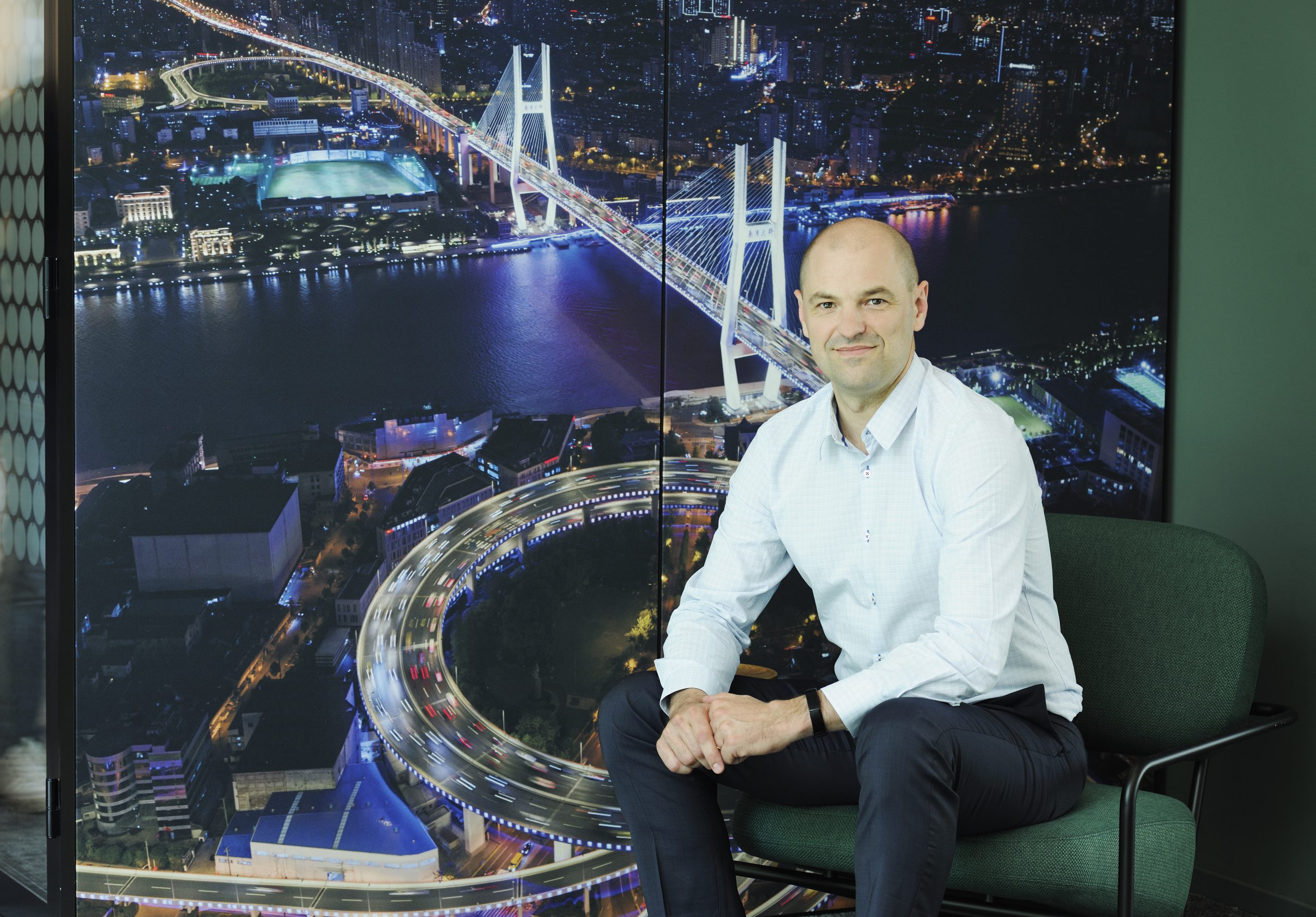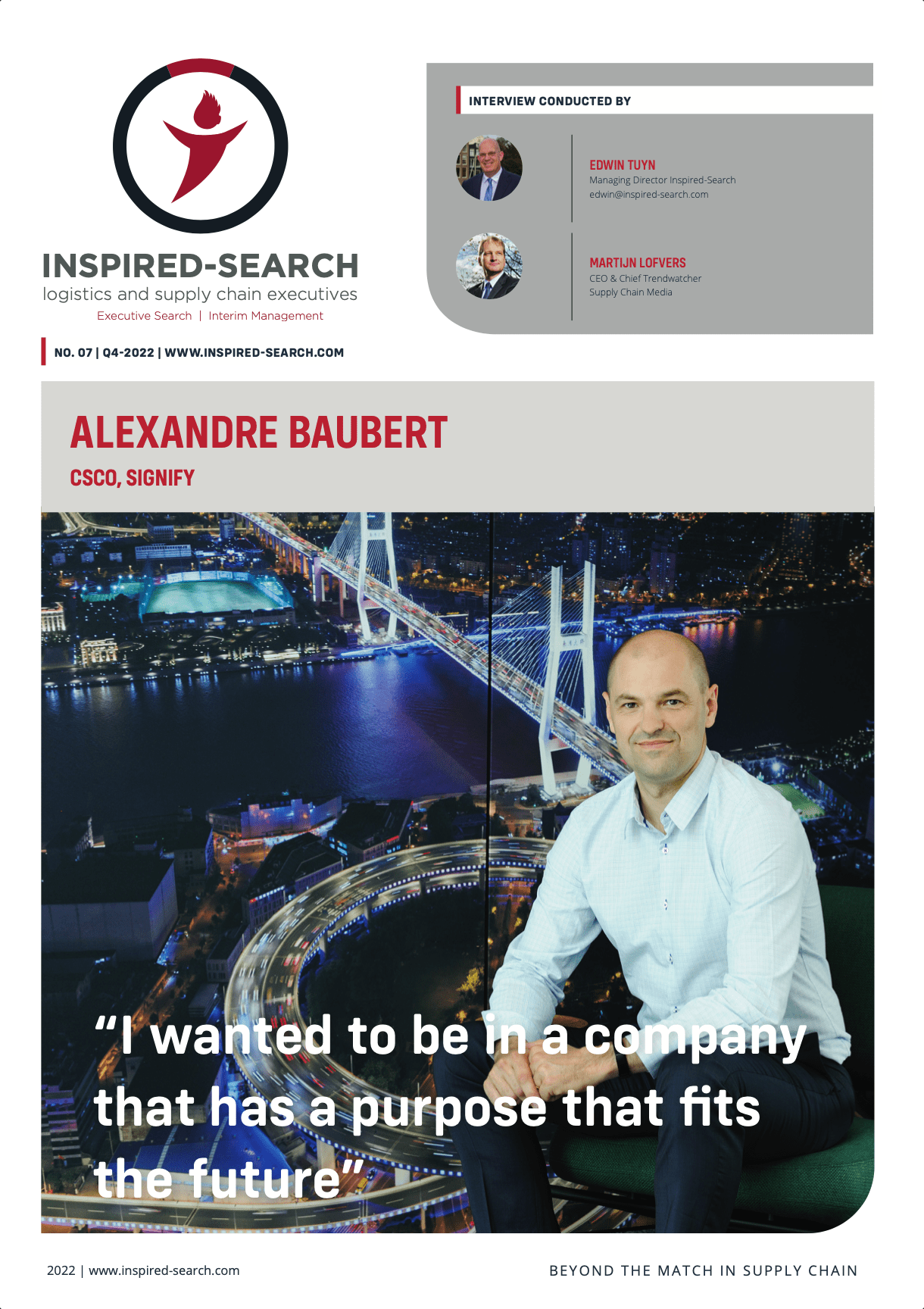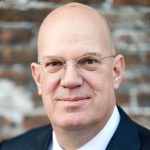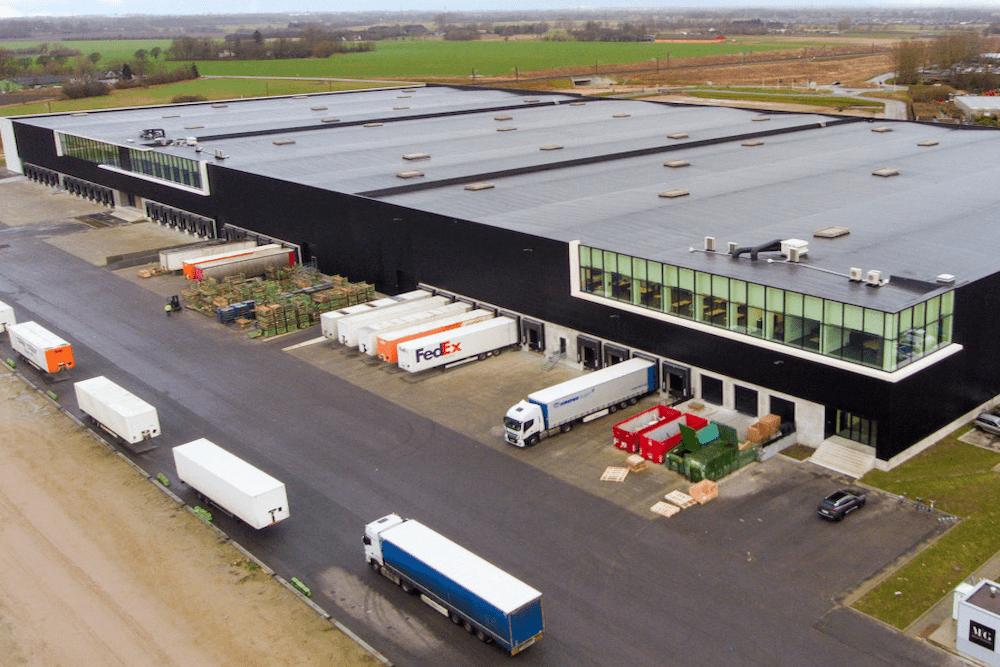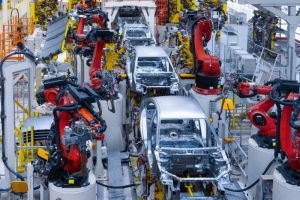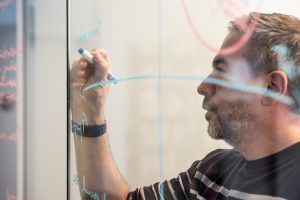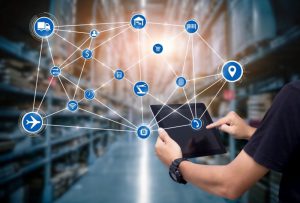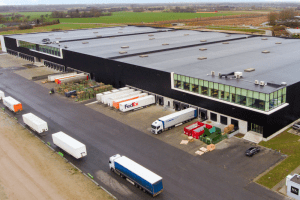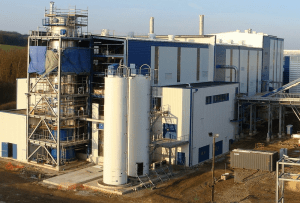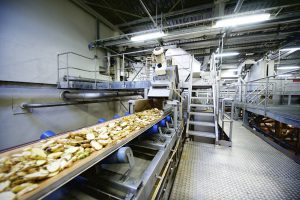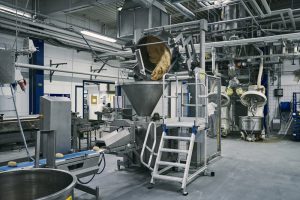“Live the purpose. Embrace the values and dare to innovate to serve your customer!” Motivating words from Alexandre Baubert who left a top job in the oil and gas sector to work for lighting company Signify. Carbon-neutral since 2020, sustainability and climate actions have been at the heart of Signify for years and, as CSCO, Baubert aims to further fulfil that company purpose. “We address the important challenges of our time, such as climate change, resource scarcity, circular economy, population growth, urbanization, and health & wellbeing. These shape the needs of our customers, and we are accelerating to help them run smarter, and save energy faster.”
He was educated in electronics engineering, and space science with a true aptitude for math. “I’m a real numbers guy,” ideal for a company that is transforming from conventional to digital lighting, providing products, solutions and data services through its smart energy-saving lighting technologies. Some call him their ‘fearless leader’ and he’s certainly had to show courage and resilience recently. “Since I joined in October 2019, we’ve faced extremely disrupted supply chain ecosystems,and the pressure is not easing ahead. We must anticipate, decide, and execute faster than ever before in this new norm, where resiliency is a competitive weapon, that you learn to sharpen, as you exit every cycle stronger than you entered it.”
Signify was created in 2016 when it separated from Philips to become an independent lighting company. Formerly known as Philips Lighting it has a long legacy of pioneering a wide range of lighting systems. Its LED and solar lighting that connectto smart technologies are some of the ways it aims to address climate change and create a sustainable, safer world.
Alexandre Baubert joined the company at the end of 2019 and immediately started to transform the supply chain function with a verticalization, specialization and simplification strategy to bring improved customer satisfaction and long-term sustainable performance, driven by a renewed, talented, and ambitious workforce.
At Signify, supply chain not only enables growth platforms and channels, it also fuels new opportunities, he says. “Our suppliers are working with us in reciprocity agreements, where we install energy saving lighting solutions in their facilities, warehouses and ships, and we help them become part of the Brighter Live, Better World purpose. For us it’s win-win, and so exciting to contribute to making an impact on society,” he says.
The CSCO is also using his experiences in space science and oil and gas to help strengthen Signify’s supply chain. “I’ve worked in industries in which you just can’t afford to make a mistake, where failure is not an option. It is all about Doing it Right. All the Time. This search for excellence in execution, is the largest opportunity for us to make gains. By applying a strong, lean and quality mindset in everything that we do, by being curious and going deeper into root causes to better understand how to do it right, so we are more accurate, and reliable in our operations we will serve our customers in the best possible way.”
Despite the global turbulence Baubert is optimistic that Signify is in a strong position to navigate the new norm and contribute to today’s energy saving goals. We spoke to him at one of his European Distribution Centers.
How did you start your career and get to your current position?
“I studied electronic engineering and did a Master of Science in spacecraft technology and satellite communications: Really, I’m a rocket scientist (he laughs). I’m a real numbers guy. I love science, data and analytics.
At the end of my studies, I joined, Schlumberger, a leader in oil and gas services. Like space science or aeronautics in general, oil and gas rely on high-tech equipment, embedded electronics & software, in constrained environments, that require high safety and quality standards but also massive long-term investments: instead of going high in the sky, oil and gas goes deep in the ground! A mix of high-tier services (MTO/ETO) and high-volume products (MTS), where one piece of drilling equipment can generate tens of millions of dollars in revenue losses per day to your customers, should the services not be executed properly. You just couldn’t afford to make a mistake from planning to delivery of the bill of resources (people, assets, parts), so the pressure was high.
When I joined Schlumberger, it was just starting to build a supply chain function. Within a couple of years, I had become totally involved in supply chain taking up challenges from process, digital and then running the North Sea operations with a USD 500 million spend portfolio. I then spent two years in Africa sorting out logistics before moving to HQ in Houston – I knew I might end up in Houston but not for oil and gas! There I rapidly headed the global procurement commodities strategy with an annual turnover of USD 20 billion. We underwent a large transformation as we centralized procurement from source to pay, from the most strategic parts to transactional excellence hubs. Then a new CEO was appointed with the ambition to transform the company inside out. We were eight experts, invited to be part of the core transformation team. We ideated, designed, and deployed the new supply chain for oil and gas, pivoted into integral demand to deliver business workflows, and introduced SAP. After three years I was appointed global head of supply chain to run the real operations, bringing the waves of transformation, in a context of commoditization and the search for efficiencies of scale, with distribution center models. For three years, it was an absolutely fascinating international journey in a top position.”
So why did you move to Signify?
“First it is about the Purpose. It is very important to have one in life and to pursue it. Today we have a huge sustainability challenge as a society. By this I mean addressing the global issues of climate action, circular economy, food availability, safety & security, and health & wellbeing. I wanted to be in a company that has a purpose that fits the future, that contributes to making a better world. Signify is extremely well positioned in this landscape with such an amazing story of innovative industrial leadership across the years, turning 125 years of history into a powerful company that now brings light to the Internet of Things!
Secondly, it was about the company values. From ‘People, Technology, Profit’ at Schlumberger, I moved into an inspirational mindset: Customer First, Greater Together, Game Changer, Passion for Results. This drives what we do and live every day. It resonates and help you drive priorities for the company and for yourself.
The third reason was a passion for innovation. This is at the heart of the overall company strategy. Our ambition is to create step change in operations, our integrated supply chain and how the strategy is articulated around customer centricity, differentiated offers, growth for sustainability, digitization as well as being a great place to work. I felt I could contribute to the future success of the company!”
You joined in October 2019. Did you manage to map out a supply chain strategy before everything changed in 2020 and did you have to revise your plan?
“Within two months we had already laid out the new setup, its objectives and communication plans, organizing the operations based on a Plan-Deliver-Perform framework. Plan focused at ring-fencing all SIOP processes & operations such as demand, finished-goods, supply, and components planning. Deliver looked to strengthen logistics, distribution, and warehousing processes and operations, for our factories, suppliers, and distribution centers flows. We spent time focusing on the change journey, the benefits expected, and how everyone could contribute.
In February 2020, I was privileged to be given the lead of a companywide operations control tower. From this COVID ‘war-room’ we could oversee everything end-to-end: sales scenarios, consequences to markets, consequences for factories and suppliers. I had the chance to be rapidly exposed to and open to everyone. In that sense COVID was an accelerator in the onboarding and scope of responsibilities. The beauty of this Operations Nerve Center was that it brought us together, with our strong procurement, manufacturing, and quality teams. The mindset of everyone was to strengthen an E2E Operations from component to revenue. We’ve kept this spirit since!
It also elevated opportunities for us to accelerate such as digitization. Since then, we have been investing significantly in digital capabilities, in all areas of our Plan-Source-Make-Deliver operations, for example deployment of IBP, TMS, RPA, REO, EWM, data & analytics, process mining, as well as source-to-contract platforms, inclusive of collaboration interfaces with suppliers and closing gaps where needed with process automation solutions. Digital investments were on our roadmap from 2019, but were accelerated in the last 24 months. We now collect an exceptional number of actual digital experiences across our operations, demonstrating practical examples of the benefits.”
As supply chain leader, how would you describe yourself and how do you inspire others?
“Commitment, Integrity, Drive and Teamwork. These are what animate me, every day. I put a lot of passion into what I do; I care about and support my team; I speak up; and above all, I dare to innovate and collaborate, taking risks to create step change so I’m a catalyst. That’s the core ‘package’ you get with me!
In addition, there are four key traits of leadership that I am looking to practice, improve every day and hopefully inspire others: Curiosity, courage, listening and optimism.
Firstly curiosity: The new norm is so dynamic that you constantly need to be alert and expect the unexpected. However, to be able to grasp the causes and effects requires something more than critical observation. You must go deeper, be curious to learn, understand and improve. If you fail to execute in the aerospace or oil and gas sector it costs millions of euros to your company and tens of millions to your customer, so you learn never to fail. Every failure is an opportunity to learn, improve and get stronger than ever before. It is all about attitude, curiosity mindset and having a tool box to go deeper into the root causes. As one said: “Curiosity is the compass that leads us to our passions. Follow it and you won’t be disappointed. The future belongs to the curious”
Courage is about taking decisions in difficult times. Courage is about speaking up, standing up, taking charge and going after challenging situations, outside your comfort zone. As Justin Cronin quoted ‘Real courage is doing the right thing when nobody’s looking; Doing the unpopular thing because it’s what you believe’. And no matter how long you train someone to be brave, you never know if they are or not until something real happens. Courage is like a muscle. It is strengthened by use.
I am so proud of our supply chain team across the world, we have very smart, talented and skilled individuals and they demonstrated such courage, determination and resilience in the last 2-3 years, as we faced many disrupted situations.
Listening along with diversity and inclusion is very important. Listening is about accepting that somebody else can have an opinion, that is not yours and can contribute to a team success. I feel that since I started my professional career, I have become a citizen of the world and I like to think that I am part of an ecosystem which thrives through its diversity. Ignoring it creates unconscious bias. I’ve been used to working in a melting pot of different cultures. We need to be open to every nationality, age, race, gender, experience etc. That starts with the basics. Everyone needs to feel part of a team and that their contribution is important. Everyone should have the chance to speak up and not be dominated by a few. Signify published for the first time a DE&I Report which I find an amazing commitment to this important topic: Quite simply, DE&I is about the way we behave towards each other and about leading by example. I believe that we will be successful when diversity, equality & inclusion will not even be a topic, but when we live it, every day.
Lastly is optimism which is about belief, ambition and commitment. A leader must show the direction, the path to a destination and, however hard it can be, to show conviction, determination, and enthusiasm to learn, grow and progress together as this is the foundation of success.”
What are your main challenges as you map out a path for the future?
“We have two main categories: business and functional. Our business challenges are trade wars (push towards localized manufacturing and sourcing), resilience (disrupted supply chain as the new norm), inflation (energy dependance, Total Cost of Ownership), sustainability (increased environmental, social & importance of governance) and workforce (evolving needs and ambitions of the global workforce).
Our functional challenges are about gaining velocity and productivity: enforcing rules & disciplines to drive operational integrity and excellence in execution; mastering data, accelerating digital power, and simplifying through automation and augmenting decisions through predictive analytics.”
When you joined Signify it still had a strong Philips culture. How do you manage this culture?
“I have immense respect and recognition for the way the industrial lighting leader of 125 years has managed to transform itself through the LED revolution and now bring light on the Internet of Things. There is certainly a lot of what you call the “Philips Culture” that got us to where we are today and we should be proud of this legacy. A culture evolves: The way I manage it is to raise expectations towards excellence in execution and to fight any kind of complacency. In simple terms: Live the purpose. Embrace the values and dare to innovate to serve your customers! That’s all that matters.”
There are many challenges in supply chain, which can frighten people off. How do you encourage talents to move into it and succeed?
“I think these are the most exciting and wanted jobs today! For sure, it is not for everyone (due to its complexity and pressure), but it is the heart of a company. The majority of business processes are connected to supply chain. If you want to succeed in your career, be curious, come and learn supply chain, and contribute to the company’s success. You won’t be disappointed.
The supply chain roles have changed significantly over the last 20 years. Today it is such a process and data driven activity, paired with human skills and business acumen.
Things are not as predictable and efficient as we would like, but that’s the opportunity and challenging part! Challenges equal opportunities. Working in Supply chain helps you build a mindset of constantly adapting yourself and the business to stay ahead in a competitive and fast changing world. You can make an impact. Supply chain is a fun game that connects all part of a company from suppliers to customers. You learn to look at the impact of a decision over a timeline. For example, during the severe shortage of components every company had to make trade-offs and business decisions to prioritize revenue or profitability based on available components. At the end, we are here to improve customer service, cost and cash of the company.
Last but not least, we do have comprehensive training, development and learning programs for all levels, so that you can grow from within and have multiple cross-functional opportunities.”
